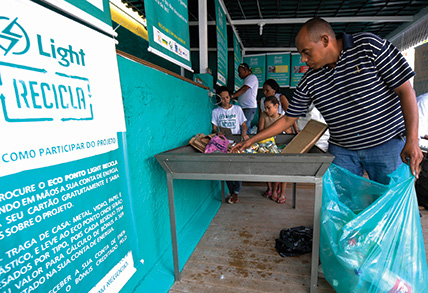Brazil does the can-can

A 100 per cent recycling total has always seemed to be an unreachable target, but next year, Brazil may well be the first country to recycle all its aluminium cans. Annie Reece finds out how they’ve done it
When one thinks of Brazil, images of golden beaches, colourful carnivals and the iconic Christ the Redeemer statue spring to mind. What doesn’t come to mind is Brazil’s aluminium recycling system, which is surprising, considering that Brazil has been the global leader in aluminium recycling for the past 11 years.
In 2010, 97.6 per cent of aluminium cans were recycled (that’s 17.7 billion containers) and injected £174 million to the domestic economy, making the seemingly elusive 100 per cent recycling rate a realistic goal for aluminium. But how has Brazil done it? This is a country where only two-thirds of homes have sewage and one-in-eight houses have no rubbish collection at all. Of the 240,000 tonnes of waste produced every day, only two per cent of it is municipally recycled. So how and why has aluminium can recycling been so successful?
Recycling aluminium is not a new habit for Brazilians, Henio de Nicola, Recycling Commission Coordinator of the Brazil Aluminium Association (ABAL) tells me: “Aluminium recycling in Brazil started at the end of ’80s when aluminium can manufacturing started. It has been a growing process – since then many programmes have been put in place to educate consumers about the importance and advantages of recycling, including programmes in schools.”
Success in aluminium recycling did not happen overnight, but took time and energy, says de Nicola, who cites money as being the strongest contributing factor to the recycling rate. Approximately 800,000 Brazilians collect aluminium cans to recycle as a source of income, as aluminium is a high-value metal. “The aggregate value of the metal is an important thing to be considered, it can provide the remuneration for all players involved in the recycling process”, de Nicola tells me. And remunerate it does – the average collector earns double the national average wage by ‘informally’ collecting waste and selling it to recycling companies.
Carlos Roberto Morais, Director of the Brazil branch of aluminium company Novelis, explains: “It may appear informal but the used beverage cans (UBC) collection network is well established and works like a Swiss watch. For example at one end waiters in bars and restaurants collect empty cans from the table, then sell them using the money for a team celebration, at the other end apartment blocks can collect more than 100 tonnes per year and sell them to pay local taxes and maintenance of the building. In the middle of this process there are thousands of collectors who have different partnerships with different UBC sources”, says Morais. “It’s like an environmental army working in order to bring back UBCs to the plant.”
The majority of this ‘army’ are not employed by the government, but are poor, itinerant waste pickers who collect aluminium cans from businesses and by sorting through general waste. These collectors often form organised collectors’ associations and can gather more than five times the amount of UBCs than the projects organised by city governments. Since Brazil’s first federal waste management law was passed in 2010 (known by its Portuguese abbreviation, PNRS), these collectors’ associations are gaining more government backing and encouragement.
“This law will drive private and public sector changes, and cities will no longer be able to send recyclable waste to landfill”, Morais tells me, adding that the new law will see more selective rubbish collection, with recycling products being sent to collectors’ associations to be separated, compacted and sold to recycling companies. “The collectors’ association may be the path to find the ‘missing two per cent’ of UBC remaining”, says Morais, hopefully. “When you jump from one to two, you improve 100 per cent. Improving from around 98 per cent to 100 per cent is another story, it is not easy but it is also not impossible... It seems to be nothing but, in Brazil, two per cent is 432,000 cans or six kilotonnes per year. An unrecovered treasure of $9 million [£5.7 million] in the landfill every single year.”
Brazil’s other recycling streams are nowhere near as successful as aluminium, partly due to the lack of infrastructure dealing with formal recycling collection and partly due to the fact that other streams are not as valuable. Regular waste collection and organised kerbside collection of recyclable material is very rare, due to the lack of government funding and the number and disorganisation of the sprawling hill-side shantytowns, or favelas. But recycling figures may yet rise further as the government hurries to improve the waste system in time for when it hosts the FIFA Confederations Cup in 2013 and the Summer Olympics in 2014.
The number and popularity of recycling reward schemes is also growing. In Rio de Janeiro, electricity company Light has introduced a scheme to incentivise recycling in Rio’s poorer areas. Light Recicla offers residents of the Santa Marta, Humaitá, Babylon and Botafogo favelas money off their electricity bills if they hand over their recycling. Light’s scheme has enabled some of the poorer residents to pay their entire bill off through their recycling, which can include paper, metals, CDs, DVDs, cooking oil, plastics, glass and cartons. Since August 2011 Light Recicla has received about 160 tonnes of recyclable material and saved residents more than £32,000 on electricity bills.
When I ask Morais what he thinks the UK can learn from Brazil’s aluminium recycling habits, he laughs: “We have to consider each country and culture before issuing any blanket recommendation, no single pill will cure all illnesses!”




